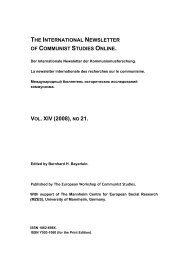11RXNdQ
11RXNdQ
11RXNdQ
You also want an ePaper? Increase the reach of your titles
YUMPU automatically turns print PDFs into web optimized ePapers that Google loves.
From one China to another* 3<br />
are elites – gentlemen who are the only ones who know how to read or count and who<br />
carry on their backs the mark of their superiority.<br />
Images, when they are materialistic, bring men together; that is to say when they begin<br />
at the beginning: with bodies, with needs, with work. To hell with rotten eggs and sharks’<br />
fins: you say that these are exotic foods because almost 40 million French people do not<br />
know what they even taste like? Then these foods are even more exotic in China since<br />
400 million Chinese – or almost – have never eaten them. Four hundred million Chinese<br />
who are hungry – just like daily paid Italian labourers, who exhaust themselves at work,<br />
like French peasants – exploited by the Chiang Kai-shek family, as 75 per cent of<br />
Westerners are by the great feudal lords of capitalism. Apart from that, of course, we do<br />
not speak their language and do not have their customs: but there is always time to talk<br />
about differences. What separates has to be learned; what unites can be seen in an instant.<br />
This man coming towards us, you will know immediately whether you see him first as a<br />
German, a Chinese, a Jew, or first as a man. And you will decide what you are on<br />
deciding what he is. Consider this coolie as a Chinese grasshopper, and you immediately<br />
become a French frog. By getting your models to pose, you will give them time to<br />
become other: other than you; other than people; other than themselves. The ‘pose’<br />
produces the elite and the pariahs, the generals and the Papuans, the Breton-looking<br />
Bretons, the Chinese-looking Chinese, and the ladies bountiful: the ideal. Cartier-<br />
Bresson’s snapshots catch people at high speed without giving them time to be<br />
superficial. At a hundredth of a second we are all the same, all of us at the heart of our<br />
human condition.<br />
Of this immense agricultural empire, we are shown only the towns: the communists are<br />
masters of the countryside. But each photograph reveals to us the ills of a backward<br />
economy: craft industry, over-population, poverty. ‘The Chinese people’, said Michaux,<br />
‘are born craft-workers … Whatever can be improvised, the Chinese have made it.’ And<br />
it is true: look at the traders, their malicious and patient faces; watch their hands, nimble<br />
hands, never still, rolling two walnuts together, like Greek hands telling their amber<br />
beads; they are made for patching things up and for thieving: ‘Ruse in China is in no way<br />
linked to Evil but is linked to everything; virtue is the best scam.’ Of course they are all<br />
schemers, all craft-workers, artists, deceitful. But if you think that they owe their<br />
shrewdness to the colour of their skin, to the shape of their brains, or to their diet, I ask<br />
you: out of a Chinese and Neapolitan, who is more ingenious, who is more resourceful?<br />
Naples against Peking: a Chinese versus a Chinese and a half. A draw is the likely result.<br />
In Naples they will pull the trick on you of the supposedly stolen fake Parkers, the<br />
watches that really have been stolen, and are illegally on sale; and the meters which have<br />
been tampered with. If you buy your tobacco from the street dealers, God knows what<br />
you will be smoking. But look at the trader who is selling cigarettes under the protective<br />
gaze of a Chiang Kai-shek and two Sun Yatsens: his eyes are heavy, his lips droop; he<br />
seems too simple-minded to be dishonest: and yet, he has opened all the packets he has<br />
on display, he has emptied the cigarettes and filled them with rubbish which he has<br />
hidden at each end with a pinch of tobacco. Industrious owing to the lack of industry,<br />
they all spend their time repairing, strengthening, containing, tying together. They fill in<br />
holes, stop walls and roofs from falling, and then, between one disaster and the next, sit<br />
on the edge of the pavement and keep an eye out for the rich while working out




